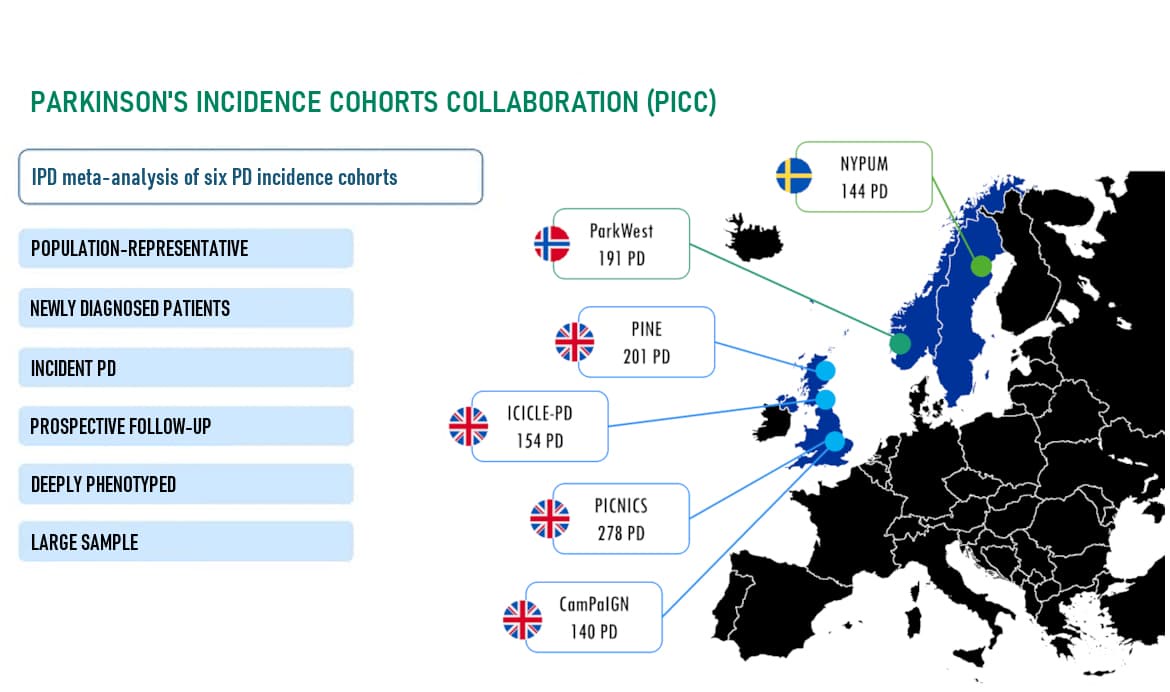- Why study prognosis in Parkinson's?
-
Robust data about prognosis (disease progression) is important for many reasons, including to:
- Inform people with Parkinson's and their relatives how they may be affected over time
- Identify factors which influence prognosis and modify them to improve prognosis where possible
- Enhance clinical trial design and make them more efficient
- Enable personalised medicine - tailored treatment according to an individual's estimated prognosis
- Why incidence cohorts?
-
Most studies of prognosis in Parkinson's have been derived from specialist clinics resulting in cohorts which under-represent the old and frail. This leads to selection bias and results in over-optimistic estimates of overall prognosis.
Incidence cohorts begin by identifying all new cases of Parkinson's in a population in a defined time period (an incidence study) and follow-up these participants over time.
By attempting to recruit and follow-up all new cases of Parkinson's in the population, selection bias should be low and the cohort should be representative of the population with Parkinson's. This results in more reliable estimates of prognosis than other study designs
- PICC Studies
-
The cohorts of the PICC study are based at the Univeristy of Aberdeen, the University of Bergen, the University of Cambridge, Newcastle University, the University of Stavanger, and Umeå University.






Information regarding each cohort can be found at:
Table 1: Characteristics of studies included in the Parkinson's Incidence Cohorts Collaboration
Study CamPaIGN ICICLE-PD NYPUM ParkWest PICNICS PINE Pooled
cohortLocation Cambridgeshire UK Newcastle/
Gateshead UKUmeå, Sweden Western Norway Cambridgeshire
UKAberdeen
UKNorthern Europe Recruitment Period 2000-2 2009-11 2004-9 2004-6 2008-10 2002-4;
2006-92000-2011 Consent to follow-up amongst incident population 79% 48% 94% 79% 74% 94% 78% Cases in analysis 141 82 + 72* 144 191 123 + 155* 201 882 + 227* Median follow-up in years 8.9 6.6 10.0 7.2 5.0 12.1 7.3 Max follow- up of data in PICC database in years 10 8 13 8 9 16 16 Cases of dementia/death 41/63 21/18 60/77 46/34 31/21 89/149 298/362 *Additional cases in ICICLE-PD and PICNICS are Inception cases but not true incidence cases, i.e. not part of the incidence study.
Follow-up durations and cases of dementia/death refer to the 2021 update of the PICC database.
- What data are available?
-
- Demographics, e.g. age, sex, ethnicity, education, smoking status
- Genetic: including APOE, GBA, MAPT, SNCA
- Hoehn &Yahr stage
- Impairment: UPDRS or MDS-UPDRS
- Cognitive: MMSE
- Dopaminergic treatment variables
- Activities of daily living: Schwab & England
- Quality of life: PDQ39
- Key clinical outcomes: functional dependency, dementia, institutionalisation, death.
- Members of Steering Group
-
- Carl Counsell (chair), Angus Macleod (University of Aberdeen, UK)
- Ole-Bjørn Tysnes (Haukeland University Hospital, Norway)
- Caroline Williams-Gray, Marta Camacho (University of Cambridge, UK)
- Rachael Lawson, Alison Yarnall (Newcastle University, UK)
- Guido Alves, Jodi Maple-Grødem (Stavanger University Hospital, Norway)
- Lars Forsgren, David Bäckström (Umeå University)
- Publications
-
Gonzalez MC, Tovar-Rios DA, Alves G, Dalen I, Williams-Gray CH, Camacho M, Forsgren L, Bäckström D, Lawson RA, Macleod AD, Counsell CE, Paquet C, DeLena C, D'Antonio F, Pilotto A, Padovani A, Blanc F, Falup-Pecurariu C, Lewis SJG, Rejdak K, Papuc E, Hort J, Nedelska Z, O'Brien J, Bonanni L, Marquié M, Boada M, Pytel V, Abdelnour C, Alcolea D, Beyer K, Tysnes O-B, Aarsland D. and Maple-Grødem J. Cognitive and Motor Decline in Dementia with Lewy Bodies and Parkinson's Disease Dementia. Mov Disord Clin Pract 2023. 10: 980-986.
Szwedo AA, Dalen I, Pedersen KF, Camacho M, Bäckström D, Forsgren L, Tzoulis C, Winder-Rhodes S, Hudson G, Liu G, Scherzer CR, Lawson RA, Yarnall AJ, Williams-Gray CH, Macleod AD, Counsell CE, Tysnes OB, Alves G, Maple-Grødem J; Parkinson's Incidence Cohorts Collaboration. GBA and APOE Impact Cognitive Decline in Parkinson's disease: A 10-Year Population-Based Study. Mov Disord. 2022;37(5):1016-27.
Camacho, M., MacLeod, A., Maple-Grødem, J., Evans, J., Breen, D., Cummings, G., Wijeyekoon, R., Greenland, J., Alves, G., Tysnes, O., Lawson, R., Barker, R. A., Williams-Gray, C.. Early constipation predicts faster dementia onset in Parkinson's disease. NPJ Parkinson's Disease 2021; 7: 45.
Ramsay N, Macleod AD, Alves G, et al. Validation of a UPDRS-/MDS-UPDRS-based definition of functional dependency for Parkinson's disease. Parkinsonism & Related Disorders 2020; 76: 49-53.
- Funders
-
PICC has been funded by the Chief Scientist Office of the Scottish Government, the Academy of Medical Sciences, NHS Grampian Endowments, and Parkinson's UK.





We are also grateful to the funders who have suppported each study included in PICC, full details of which can be found at each cohort's homepage.


